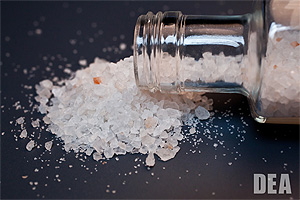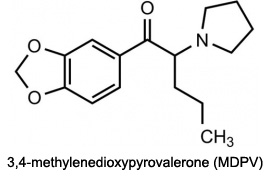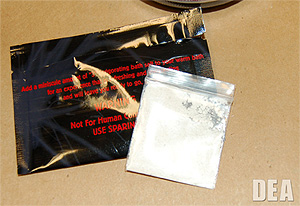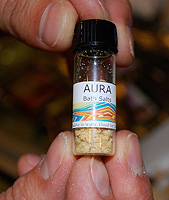Neuroscience For Kids
Bath Salts
By Allison A. Curley, Ph.D., Neuroscience for Kids Guest Writer
 "Bath salts" are a dangerous new class of synthetic drugs with no
relation to the scented granules you may use to unwind in the tub. Other
common street names for these drugs include "plant food," "vanilla sky,"
and "purple wave."
"Bath salts" are a dangerous new class of synthetic drugs with no
relation to the scented granules you may use to unwind in the tub. Other
common street names for these drugs include "plant food," "vanilla sky,"
and "purple wave."
Similar to amphetamines and cocaine, bath salts are stimulants, meaning that they improve mood and energy levels and make users feel more alert by increasing levels of the neurotransmitter dopamine in the brain. This increase in dopamine also means that bath salts can be addictive. Users commonly swallow, inhale, or inject the drug. The effects are felt after about 15 minutes, and users feel high for at least 4-6 hours.
The term bath salts doesn't refer to just one drug, but rather a group of chemically-related substances that are similar to the naturally-occurring stimulant cathinone, a substance derived from the khat plant. Unlike cathinone, however, bath salts aren't found in nature - they're concocted by amateur chemists.
 Most often bath salts contain the chemicals mephedrone,
methylone, or the tongue-twister 3,4-methylenedioxypyrovalerone (known
simply as MDPV), but current estimates suggest there may be over 100
different chemicals being marketed as bath salts. That means that when you
take bath salts, you don't really know what you're putting into your body,
or how it's going to affect your brain.
Most often bath salts contain the chemicals mephedrone,
methylone, or the tongue-twister 3,4-methylenedioxypyrovalerone (known
simply as MDPV), but current estimates suggest there may be over 100
different chemicals being marketed as bath salts. That means that when you
take bath salts, you don't really know what you're putting into your body,
or how it's going to affect your brain.
Until recently, bath salts were legal, but only because they weren't included in current laws. But that changed when a recent spike in use caused the Drug Enforcement Agency (DEA) to take emergency action. Across the United States, poison control centers received just over 300 calls related to the drug in 2010, but more than 6,000 calls in 2011. In September of 2011, the DEA banned three of the common components of bath salts, and earlier this year a law was enacted that makes producing, selling, or possessing 28 of these substances illegal.
 However, banning the drugs has been only partially effective because
drug makers can avoid the law by making subtle changes to the composition
of these drugs. Another trick used to avoid breaking the law is by
labeling the drugs "not for human consumption."
However, banning the drugs has been only partially effective because
drug makers can avoid the law by making subtle changes to the composition
of these drugs. Another trick used to avoid breaking the law is by
labeling the drugs "not for human consumption."
Because bath salts are relatively new, not a lot is known about their effects. But what is known is troubling. Use of bath salts can produce life-threatening effects such as:
- elevated heart rate (tachycardia) and blood pressure (hypertension)
- increased body temperature (hyperthermia)
- chest pain
- delusions and hallucinations
- severe agitation
- paranoia
- combative behavior
- suicide
- nausea and vomiting
- dizziness
 Nora Volkow, M.D., Director of the National Institute on Drug Abuse,
warned about the hazardous effects of bath salts last year. These drugs
are particularly dangerous, she said, because their chemical composition
and long-term effects are largely unknown.
Nora Volkow, M.D., Director of the National Institute on Drug Abuse,
warned about the hazardous effects of bath salts last year. These drugs
are particularly dangerous, she said, because their chemical composition
and long-term effects are largely unknown.
For more information about bath salts, see:
- Bath Salts - from the National Institute on Drug Abuse
- The Partnership at Drugfree.org
- Nora Volkow's message
- PBS Newshour article and video
- National Public Radio segment
Copyright © 1996-2012, Eric H. Chudler, University of Washington
